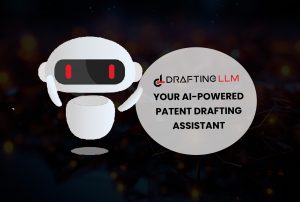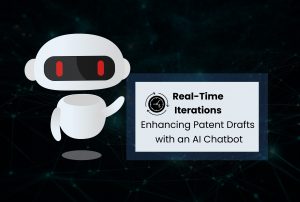
In the rapidly evolving world of intellectual property, innovation is the cornerstone of progress and success. At the forefront of this revolution are Large Language Models (LLMs), which are reshaping the patent development landscape. XLSCOUT is harnessing the transformative power of LLMs to provide an unparalleled suite of platforms that amplify the creative process from ideation to patent monetization.
With our cutting-edge platform Drafting LLM, inventors and patent professionals can generate preliminary patent drafts with unprecedented ease and refine them through real-time iterations, facilitated by an intelligent AI chatbot. This blend of AI technology and human expertise is not just enhancing the efficiency of drafting patents but is also setting a new standard in the protection and commercialization of inventions.
The Advent of AI in Intellectual Property
The integration of Artificial Intelligence (AI) into the realm of Intellectual Property (IP) marks a significant milestone in the technological advancement of legal and creative industries. This advent is not just a trend; it’s a paradigm shift that promises to redefine how we approach the ideation, protection, and management of inventions.
AI, particularly through the application of Large Language Models (LLMs), is carving out a new landscape in IP. LLMs are sophisticated tools that learn from vast datasets of patent language and legal precedents. They have the ability to understand and generate complex technical jargon, making them ideal for drafting patent applications that adhere to stringent legal requirements.
The impact of AI in IP is multifaceted. It streamlines the patent drafting process, reducing the time it takes for inventors to secure protection for their ideas. AI tools analyze invention disclosures and produce preliminary patent drafts, which are foundational documents that can be further refined. This is not merely a convenience but a strategic advantage, as it allows inventors and firms to rapidly secure IP rights in competitive markets.
Furthermore, AI facilitates the democratization of the patenting process. By lowering the barrier to entry, independent inventors and small firms can access tools that were once the province of large corporations with deep pockets. AI in IP thus levels the playing field, fostering a more inclusive environment for innovation.
AI’s real-time analysis capabilities also enhance the quality of patents. By providing immediate feedback, the Drafting LLM enables inventors to iteratively improve their applications, increasing the likelihood of approval. This iterative process, supported by AI, ensures a more robust and defensible patent portfolio.
Lastly, AI extends its benefits to patent monetization. By identifying potential out-licensing opportunities and analyzing the marketability of patents, AI aids in developing strategies for licensing or selling IP, ensuring inventors and companies maximize the return on their innovative efforts.
Transforming Patent Workflows with Generative AI
The emergence of generative AI is transforming patent workflows, introducing a level of automation and intelligence that is reshaping the landscape of intellectual property management. Generative AI, with its ability to create content, analyze data, and learn from interactions, is not just a tool but a game-changer for innovators and patent professionals alike.
At the heart of this transformation is the ability of generative AI to streamline the entire lifecycle of a patent. From the initial stages of ideation, where inventors conceptualize new ideas, to the drafting of patent applications, generative AI accelerates and refines these processes. With platforms like XLSCOUT, generative AI can take a simple invention disclosure and turn it into a comprehensive draft, ready for legal scrutiny and filing. This significantly reduces the time-consuming and often complex task of patent drafting, freeing inventors and attorneys to focus on the more strategic aspects of IP management.
Moreover, generative AI enhances the quality of patent applications. It does so by analyzing existing patents and literature to ensure that new applications are novel and non-obvious, two critical criteria in patent law. By drawing from extensive databases, AI can compare and contrast claims, suggest improvements, and identify potential areas of infringement risk, thereby strengthening the patent’s defensibility.
The collaborative element of generative AI is also notable. It acts as a co-pilot, enabling real-time collaboration between inventors and legal teams. AI-powered tools provide suggestions and corrections, adapt to user inputs, and learn from each interaction, making the patent drafting process more interactive and dynamic.
When it comes to patent prosecution and litigation, generative AI tools can predict outcomes, suggest legal arguments, and even help in crafting responses to patent offices. This predictive power is invaluable in making strategic decisions, potentially saving organizations considerable time and resources.
Finally, generative AI extends its capabilities to the monetization of patents. By leveraging AI-driven market analysis and valuation models, inventors can identify lucrative licensing opportunities and potential buyers more efficiently.
From Idea to IP: Streamlining Patent Creation with AI
The journey from a spark of creativity to a fully realized intellectual property (IP) asset is a path often fraught with complexity and challenges. However, AI technology, particularly in the form of generative AI, is streamlining this process, transforming the way ideas evolve into protected patents.
At the vanguard of this innovation is XLSCOUT’s Ideacue platform, a tool designed to fuel the fires of invention. When users input their core problem and invention disclosure, Ideacue leverages AI to delve into a vast repository of knowledge, providing novel and enhanced ideas that can elevate an initial concept. This ideation process is crucial, as it expands the inventor’s vision, uncovering potential that might otherwise remain untapped.
Once an idea is refined, it transitions into the drafting phase, where generative AI comes into play. AI-driven platforms like Drafting LLM take the enhanced idea and transform it into a solid patent draft, articulating the invention in legal terms and aligning it with patent office requirements. This not only simplifies the intricate process of patent drafting but also ensures a higher quality of the patent application, making it more likely to withstand legal scrutiny.
But the role of AI doesn’t end with drafting. The ClaimChart LLM platform revolutionizes patent monetization by aiding users in identifying and mapping potential patent infringements. It generates detailed claim charts and evidence of use (EoU) charts, essential tools for patent enforcement and licensing negotiations. This aspect of AI is particularly transformative, as it provides a clear path to monetization, helping inventors and businesses to capitalize on their IP effectively.
The integration of AI into the patent lifecycle equips inventors with powerful tools that not only conserve time and resources but also enhance the overall quality of IP assets. From ideation with Ideacue to monetization with ClaimChart LLM, AI is making the dream of turning ideas into tangible assets, a more streamlined and successful reality. With these AI solutions, XLSCOUT is leading the charge in bridging the gap between innovation and IP protection, making it an exciting time for inventors and IP professionals worldwide.
The Role of Large Language Models in Ideation and Innovation
In the realm of innovation, the birth of an idea is just the beginning. Bringing that idea to fruition and protecting it through intellectual property (IP) rights is where the true challenge lies. Large Language Models (LLMs) are playing an increasingly pivotal role in this journey, particularly in the ideation and innovation phases, by unlocking new potentials and streamlining the creative process.
LLMs like XLSCOUT’s Ideacue are redefining ideation—a foundational step in the innovation pipeline. When inventors input their initial problem statement and invention disclosure, Ideacue leverages the analytical prowess of LLMs to process this information against an expansive database of existing patents, scientific journals, and technical documents. It then generates a spectrum of novel concepts and enhancements, broadening the inventor’s perspective and potentially leading to breakthrough innovations.
These AI-driven insights are particularly valuable in today’s fast-paced environment where the first to file can often be the winner in the IP race. By rapidly generating diversified ideas and suggesting improvements, LLMs ensure inventors are not boxed in by their initial thoughts, thereby maximizing the inventive potential of their IP.
Beyond ideation, LLMs facilitate the early stages of innovation by predicting the feasibility and patentability of ideas. They provide a preliminary assessment of the invention’s novelty and non-obviousness, guiding inventors on whether to proceed with the patenting process. This preemptive analysis is crucial, as it informs the strategic direction of R&D investments, saving time and resources.
Furthermore, LLMs aid in navigating the complex landscape of IP law. By understanding and interpreting legal jargon, they help inventors articulate their ideas in legally robust terms, laying a solid foundation for patent drafting. This ensures that when an invention enters the patent drafting stage, it does so with a clear, defensible claim set, increasing the likelihood of patent grant.
Drafting LLM: Your AI-Powered Patent Drafting Assistant

Drafting a patent application is a meticulous and strategic task that requires a blend of technical expertise and legal acumen. Enter Drafting LLM, XLSCOUT’s AI-powered patent drafting assistant, which is transforming this daunting task into a streamlined, efficient process.
Drafting LLM stands at the intersection of technology and law, providing an intelligent drafting environment that understands the intricacies of patent documentation. Inventors begin by inputting their claims or invention disclosures into the platform. Leveraging the power of AI, Drafting LLM then generates a preliminary patent draft that captures the essence of the invention while adhering to the rigorous standards set by patent offices.
The precision of Drafting LLM’s output is remarkable, as it tailors the language and structure of the application to reflect the legal requirements of patentability. It can distinguish between different jurisdictions, ensuring that the draft aligns with the specific guidelines and precedents of the targeted patent office. This level of customization is a significant advantage, as it mitigates the risk of rejection due to non-compliance with formalities.
Moreover, Drafting LLM is interactive; it acts as a collaborative partner rather than a one-off service. The platform’s AI chatbot provides real-time iterations and suggestions, allowing inventors to refine their drafts in sync with the AI’s guidance. This iterative process not only enhances the quality of the application but also educates the inventors, improving their understanding of patent drafting nuances.
Drafting LLM also streamlines the patent attorney’s workflow by automating the routine aspects of drafting. This frees up time for patent professionals to concentrate on more complex legal strategies and client consultations, adding value to their services and fostering a more productive attorney-client relationship.
In essence, Drafting LLM is revolutionizing the patent drafting process. It empowers inventors to translate their innovations into legally robust patents with greater speed and less effort, paving the way for a new era in IP development where AI is the trusted assistant for every patent drafter.
Real-Time Iterations: Enhancing Patent Drafts with an AI Chatbot

The patent drafting process is inherently iterative. Each revision hones the application, ensuring precision and compliance with complex legal requirements. XLSCOUT’s Drafting LLM platform introduces a groundbreaking feature to this iterative process: an AI chatbot that provides real-time feedback and suggestions, enhancing the quality of patent drafts in ways previously unimagined.
The real-time iterations offered by the chatbot are not simply cosmetic adjustments. The AI delves into the substance of the patent, making refinements as per the user inputs that can bolster the strength and breadth of the claims. It can spot potential weaknesses or vagueness in the language that might be grounds for rejection or dispute, prompting the user to clarify and tighten their arguments.
By integrating real-time iterations into the drafting process, XLSCOUT’s Drafting LLM with its AI chatbot is not just simplifying patent creation—it’s elevating it. This innovative approach ensures that every draft is a step closer to perfection, paving the way for stronger patents and, ultimately, more robust intellectual property protection.
Maximizing Patent Potential: AI Tools for Monetization Strategies
In the competitive world of intellectual property, the ability to monetize patents effectively is as important as the innovation itself. Artificial Intelligence (AI) tools are revolutionizing this domain, offering strategic insights and actionable data that maximize the potential of patents. XLSCOUT’s ClaimChart LLM exemplifies this innovation, providing a powerful platform for patent monetization strategies.
The ClaimChart LLM platform is designed to assist patent owners in navigating the complex landscape of patent monetization. By generating AI-driven claim charts and evidence of use (EoU) charts, the tool offers a comprehensive analysis that maps patented technologies to products in the market. This facilitates the identification of infringement opportunities, which is a critical step in licensing negotiations and patent litigation.
These AI-generated documents are meticulously detailed, aligning specific patent claims with corresponding features of products or services that may infringe upon them. This not only highlights potential licensing opportunities but also strengthens the patent owner’s position in negotiations, providing a clear and persuasive argument for the value of their IP.
Moreover, ClaimChart LLM’s intelligent search capabilities enable patent owners to scout for infringing products across a vast array of markets with unprecedented speed and efficiency. This proactive approach opens up new revenue streams by pinpointing licensing targets that might otherwise go unnoticed.
AI tools also offer predictive analytics, which can forecast market trends and suggest the most lucrative industries and geographies for patent enforcement. This foresight allows patent owners to strategically position their IP portfolios, ensuring they reap the maximum benefits from their patents.
In essence, AI tools like ClaimChart LLM are indispensable allies in the quest to monetize patents. By leveraging the power of AI, patent owners can not only protect their innovations but also turn them into profitable assets. This is the new frontier in patent strategy, where AI is not just a facilitator but a catalyst for maximizing the financial potential of intellectual property.
Cutting-Edge AI for Patent Professionals: A Closer Look at XLSCOUT’s Solutions
In the intricate world of patent management, where precision and speed are paramount, XLSCOUT is at the forefront, offering cutting-edge AI solutions tailored for patent professionals. XLSCOUT’s suite of tools, powered by advanced artificial intelligence, is crafted to meet the multifaceted demands of patent creation, protection, and monetization.
For patent professionals tasked with the initial stages of IP creation, XLSCOUT’s Ideacue platform is a beacon of innovation. It uses AI to assist in the ideation process, taking the seed of an invention and nurturing it into a forest of possibilities. By inputting a problem statement or invention disclosure, professionals can access a breadth of AI-generated ideas that push the boundaries of innovation, ensuring a robust foundation for patent drafting.
Transitioning from ideation to execution, XLSCOUT’s Drafting LLM becomes an indispensable ally. This AI-driven assistant streamlines the patent drafting process by producing initial drafts from user inputs. It comprehends the complexity of patent law, translating technical inventions into legally sound documents, thus saving patent professionals countless hours of meticulous work.
But XLSCOUT’s prowess extends beyond the drafting table. The ClaimChart LLM platform revolutionizes how patent professionals approach monetization. By generating detailed claim charts and EoU charts, it identifies potential infringement cases, paving the way for strategic licensing and enforcement actions. This AI tool not only uncovers monetization opportunities but also provides the data-driven insights necessary for making informed decisions on patent portfolios.
The integration of AI in patent workflows also brings predictive analytics into the hands of patent professionals. With the ability to analyze market trends and the legal landscape, XLSCOUT’s tools empower professionals to advise clients with a forward-looking approach, anticipating shifts and opportunities in the IP marketplace.
XLSCOUT’s AI solutions represent a leap forward for patent professionals. They encapsulate efficiency, innovation, and strategic foresight, offering a competitive edge in the fast-paced world of intellectual property. In an era where staying ahead means leveraging the latest technology, XLSCOUT’s AI platforms are not just tools but strategic partners in the quest to maximize the value of IP assets.
The Future of Patent Development: Integrating LLMs into Your Strategy
The landscape of patent development is undergoing a profound transformation, driven by the integration of Large Language Models (LLMs) into strategic planning. As the complexity of innovations grows, so does the need for sophisticated tools to manage the lifecycle of patents. LLMs are emerging as pivotal assets in this regard, offering forward-thinking strategies to navigate the future of patent development.
Integrating LLMs into the patent strategy equips stakeholders with a powerful analytical engine. XLSCOUT’s suite of AI-driven platforms exemplifies this integration, turning the tide from traditional, labor-intensive patent drafting and analysis to a more intelligent, automated approach. LLMs like Drafting LLM and Ideacue are not just streamlining workflows; they’re enhancing the creative and legal quality of patents, ensuring that they stand up to the scrutiny of patent offices and the market’s demands.
For ideation, LLMs provide a wellspring of inspiration, suggesting novel approaches and uncovering hidden facets of inventions that can lead to broader patent claims. In drafting, they transform complex technical disclosures into coherent, comprehensive patent applications, embodying the essence of the invention with precision and legal acumen. The result is a streamlined path from conception to filing, marked by speed and efficiency.
On the monetization front, LLMs like ClaimChart LLM are reshaping patent infringement by creating AI-generated claim charts. By automating the generation of claim charts and pinpointing potential infringements, these models provide a clear roadmap for licensing and enforcement, turning patents into lucrative assets.
The future of patent development with LLMs is also about adaptability and learning. As AI models continue to learn from data and user interactions, they will become even more nuanced and effective, offering personalized recommendations and evolving with the ever-changing landscape of IP law.
Incorporating LLMs into patent development strategies is not merely a trend but a requisite step for those looking to lead in innovation. XLSCOUT’s AI platforms demonstrate the immense potential of this integration, paving the way for a future where the synergy between human expertise and artificial intelligence defines the new standard in patent development.

